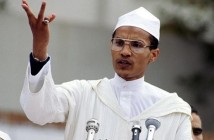Manhasset — Foreign Minister Taib Fassi Fihri said, on Thursday night in Manhasset (New York suburbs), that the ongoing normalization process of the Moroccan-Algerian relations is likely to “contribute to the resolution” of the Sahara issue.
This process which covers “many areas as well as the exchange of ministerial visits is likely to help meeting the challenges facing the Arab Maghreb region at the economic and security levels, thus contributing to settling this regional dispute,” Fassi Fihri said at a press briefing following the end of the 8th round of the UN-backed informal talks on the Sahara, held on July 19-21.
In this regard, he called on Algeria to adhere to international law, notably the humanitarian law in the Tindouf camps.
“The 8th informal talks allowed the Moroccan to reiterate its call upon the international community and Algeria, as host country for refugees on its territory, to apply first and foremost the international humanitarian law, notably the organization and registration” of the population who have been living for decades in the Tindouf camps (south-western Algeria), said the Moroccan official.
Fassi Fihri pointed to “an ambiguity concerning the laws applied in the camps in the Algerian territory,” stressing the responsibilities and commitment which Algeria should uphold.
Other parties continue to stick to rigid stands, he deplored , denouncing that the polisario has reneged on its commitments relating notably to the inclusion of the human rights question,”which itself had raised.”
Fassi Fihri also pointed to “the strong reluctance of the polisario to the innovative approach initiated by the U.N. Personal Envoy, Christopher Ross, as well as the new themes included in this approach,” namely territorial governance, relating particularly to education, health and the environment.
Fassi Fihri noted with satisfaction that the United Nations, as stipulated in the Security Council’s latest resolution, insists that both parties be part of this parallel approach.
The Moroccan official stressed the “need to involve (in future meetings) legitimate and credible representatives of the southern provinces and abroad, so that they can contribute and reflect on a final settlement.”
Natural resoucres are among the issues included in this approach, added the Minister.
Morocco, meanwhile, expressed its “full willingness to continue its consideration of all these points,” said Fassi Fihri.
This round, he said, was also a new opportunity to present the Moroccan autonomy initiative as a comprehensive and legitimate proposal, as it was pointed out by the Security Council, and recall its full respect of international legality.
He made it clear that the domestic front remains unified regarding the legitimacy and justness of the national cause, adding that Morocco will spare no effort to press ahead with development projects at the socio-economic, cultural and political levels.
In this connection, Fassi Fihri recalled the the landslide approval by the Moroccan people of the Kingdom’s new constitution following a referendum on July 1.
The Moroccan delegation to the talks was composed of Foreign Minister Taib Fassi Fihri, Director General of intelligence agency (DGED) Mohamed Yassine Mansouri, and Secretary General of the Royal Advisory Council for Saharan Affairs (CORCAS) Maouelainin Khalihanna Maouelainin.






